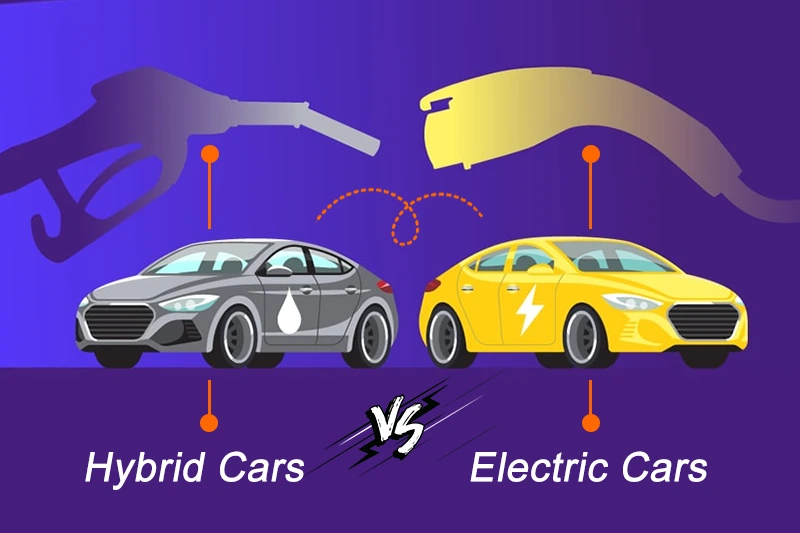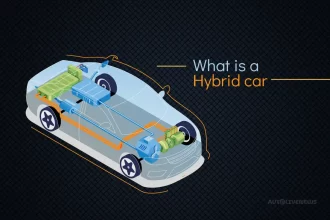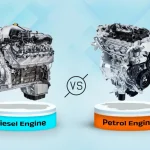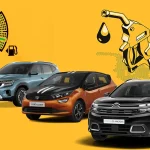What if you could drive a car that cuts fuel costs without sacrificing the convenience of a petrol engine? Fortunately for you, hybrid electric vehicles (HEVs) combine the convenience of a petrol or diesel car with the eco-friendly push of electric power. In this blog, we’re discussing the advantages and Disadvantages of Hybrid vehicles in detail, as well as the different types of hybrids and how they work.
While the environmental benefit and higher fuel efficiency are well-known pros, we’ve curated a detailed list of the pros and cons of hybrid cars. So buckle up, and let’s find out if a hybrid car is exactly what you need!
What Is A Hybrid Car?
Hybrid cars use an internal combustion engine (ICE) and an electric motor. This highly efficient system combines two sources of power to consume less fuel and create fewer CO2 emissions.
What Are The Types Of Hybrid Cars?
Though the base mechanism of all hybrids remains the same: an electric motor and an ICE, there are a few different types of hybrid cars you can consider!
1. Mild Hybrids
A mild hybrid car is fitted with a small electric motor that gives the conventional engine a slight boost during acceleration. MHEVs:
- Don’t need to be charged externally.
- Draw power from the regenerative braking system instead.
- Can’t run on electric power alone.
2. Full Hybrids
Full hybrids are fitted with more powerful electric motors. These cars can run on electric power alone. Full hybrids can be further segregated into two types:
a. Series Hybrids
In series hybrids, the electric motor is the car’s main source of power.
- The ICE engine is only used to charge the car’s electric generator.
- The battery powers the car instead of the engine
- Series hybrid cars are also called range extenders.
b. Parallel Hybrids
In parallel hybrids, both the electric motor and engine work parallel to each other to propel the car’s wheels.
- The ICE engine and motor either work together or independently to move the car forward
- To reduce the dependency on the engine, the battery powers the motor.
- These are fuel-efficient on both city and highway roads.
3. Plug-In Hybrids
Plug-in hybrids represent the true halfway point between hybrids and EVs. A plug-in hybrid is fitted with a large battery pack that:
- Doesn’t charge solely through internal means.
- Can be charged externally and also via regenerative braking.
Due to their large batteries, they provide a longer all-electric range than other hybrid cars. Once they run out of electric power, they run on power from the combustion engine.
How Do Hybrid Cars Work?
In hybrid cars, the internal combustion engine acts as the primary source of power, while one or more electric motors are used as a second source of power. Motors use energy stored in batteries, which are charged through regenerative braking and by the process of internal combustion engine. Its batteries also help reduce engine idling when the car is halted. All these features come together to deliver better mileage without compromising on performance.
Key Components of Hybrid Electric Cars
Understanding hybrid vehicle components and how they work will give you an insight into the working and maintenance of HEVs.

Internal Combustion Engine (ICE)
- An ICE engine runs on fossil fuels like diesel or petrol. ICE engines are usually the main source of power in hybrid cars (excluding series hybrids).
Electric Traction Motor
- The electric traction motor powers the car at low speeds and assists the engine during acceleration. It is usually powered by electric energy from the car’s battery pack but is sometimes charged via an onboard generator.
Electric Generator
- Electric generators use the energy from regenerative braking to generate electricity, which is then transferred to the traction battery pack. In series hybrids, the generator draws power from the ICE engine instead and uses it to charge the battery pack.
Regenerative Braking System
- A regenerative braking system transfers the energy generated while braking and uses it to charge the traction battery pack. This extends the life of the battery and also improves the fuel efficiency of hybrid cars.
Traction Battery Pack
- A hybrid car’s traction battery pack stores the energy generated via regenerative braking and is charged by the generator. It provides power to the electric motor and can also power electric components, like lights.
Power Control Unit (PCU)
- The Power Control Unit manages the flow of electrical energy between the components of hybrid cars by controlling the speed of the traction motor. It ensures the car uses the right power source—electric motor or engine—at the right time.
Transmission System
- Hybrid electric cars use conventional transmission systems, similar to those in ICE cars. The transmission transfers the power generated in the engine to the drive shaft, using mechanical power to propel the car’s wheels.
Cooling System
- A cooling system (also called a thermal system) keeps the electric motor, engine, and other electronic parts at the optimal operating temperature.
Fuel Tank
- Much like petrol or diesel cars, hybrids are equipped with a fuel tank to store fuel. The tank is filled through a nozzle from the fuel dispenser.
Pros And Cons of Hybrid Cars
Now that we’ve looked at the various types of hybrid cars, let’s explore the many advantages and disadvantages of hybrid vehicles. Here’s everything you need to know if you’re planning to go hybrid.
Advantages Of Hybrid Cars
Fuel Economy
- Let’s talk about fuel efficiency in hybrid cars and how it lightens the load on your wallet. HEVs provide high mileage by pairing a small and highly efficient internal combustion engine with an electric motor. Hybrid cars solely use electric power at low speeds, which reduces your dependence on fossil fuels and results in a higher fuel economy. Yay, savings!
Eco-Friendly
- One of the main benefits of hybrid cars is how eco-friendly they are. Since hybrids consume less fossil fuel, they have a lower environmental impact than standard petrol or diesel cars. Go hybrid to significantly reduce your carbon footprint!
Automatic Start and Stop
- Don’t you wish that your engine would turn itself off in idle traffic? Enter automatic start and stop systems. A hybrid car’s engine starts only when the accelerator is pressed and automatically turns off when the vehicle is stationary. This reduces running costs and relieves driver fatigue, especially in the congested city streets of Mumbai or Bangalore.
- What’s more, hybrid cars also have silent electric motors and deliver a smooth and quiet ride, so no more cabin noise during long-distance trips!
Regenerative Braking System Benefits
- Regenerative braking is one of the best advantages of hybrid vehicles. It converts the kinetic energy generated during braking into electrical energy and uses it to charge the car’s battery. By using the resistance caused during braking, regen braking increases efficiency and helps you travel more kilometers on less fuel.
Require Less Maintenance
- One of the advantages of hybrid cars is how low-maintenance they are. Since hybrids use an electric motor as a secondary source of power, it reduces the pressure on the car engine. Furthermore, the regenerative braking system reduces strain on brake pads, which extends their lifespan as well.
Lighter Weight
- Hybrid cars use lightweight materials in the manufacturing process and are fitted with smaller and lighter ICE engines. This makes them highly aerodynamic and allows them to run on less energy.
A More Reliable Fuel Type
- Hybrid cars eliminate range anxiety—the fear that you won’t have enough electric charge to drive your car from point A to point B. Hybrid owners don’t have to worry about range, as they can easily switch to the ICE engine once electric power runs out.
High Resale Value
- Another one of the many benefits of hybrid cars is that they generally have a high resale value. The constantly rising prices of fossil fuels like petrol and diesel are convincing most car owners to switch to electric and hybrid.
- Since new hybrid cars are more expensive than fuel-powered ones, second-hand hybrid cars are in high demand. This is why most hybrid car models have high resale value in the used car market!
Disadvantages Of Hybrid Cars
Expensive to Buy
- Now that we’ve looked at the positives, let’s explore the drawbacks of hybrid cars. Companies need to spend a lot of money on researching, designing, and building hybrid car technology. This is why the hybrid car price in India is higher than that of EVs or ICE cars.
- Currently, the government does not offer any benefits or subsidies on the purchase of hybrid cars; they are taxed at 28%, while EVs have a lower tax rate of 5%. This not only raises their price, it also delays the break-even point.
- The break-even point is the stage where the savings from reduced fuel costs equals the premium you pay for a hybrid car. If you buy a highly priced hybrid car, it will take years for you to make your money back in fuel savings.
- Higher costs of production and tax rates result in lower demand, which makes manufacturers less willing to introduce newer hybrid models, and raises the prices of existing ones. High prices are one of the major disadvantages of hybrid vehicles that dissuade people from buying them and keep demand low.
Higher Maintenance Costs
- Higher maintenance costs are the second drawback in our list of hybrid vehicle cons. Hybrid cars use a combination of an ICE engine and an electric motor. Due to the rapidly evolving technology and the complex mechanisms of hybrids, not many mechanics know how to work on them. There are ones that do, but it’ll cost you a lot.
- So, what is hybrid car maintenance really like—is it expensive or not? In general, HEVs require less maintenance than ICE or EV cars. But when there are malfunctions, you’ll end up shelling out a lot more money.
Higher Insurance
- As far as the advantages and disadvantages of hybrid cars are concerned, insurance firms are very particular about the cons. The high cost of maintenance and battery replacement, high market price, and lower availability of qualified mechanics are why hybrid car insurance is more expensive than ICE or EV insurance.
- More research and the rising popularity of HEVs may reduce insurance prices in the future. But for now, higher insurance is one of the disadvantages of hybrid cars.
Lower Performance and Poorer Handling
- Hybrid cars have an engine as well as an electric motor, which can make them heavier and lower their aerodynamics and fuel efficiency. To combat this, manufacturers equip hybrids with smaller and lighter engines. This makes them feel less sporty and also results in a lower range and reduced performance.
- However, hybrid cars that are tuned for performance won’t sacrifice any power to get there. A BMW hybrid will feel much sportier than a Maruti Suzuki one since the former is the ‘ultimate driving machine’ while the latter focuses on the ‘paisa vasool’ aspect.
High Voltage Dangers
- Hybrid car batteries have a high voltage, which can pose certain safety concerns. In an accident, passengers and rescuers face the risk of electrocution, making this one of the scarier disadvantages of hybrid vehicles.
Battery Replacement Can Be Expensive
- Finally, the last point on our list of hybrid vehicle cons is the high cost of battery replacement. All batteries, including those in your phones and laptops, have a limited lifespan. In the same way, hybrid car batteries can deteriorate after a certain point and need to be replaced.
- If you believe that battery replacement is no big deal, think again! The hybrid car battery replacement cost in India can start from ₹50,000 and go all the way up to ₹8 lakhs. Sometimes, the cost of replacing the battery can be about 30%–50% of the car’s original price!
- But why is replacing a car battery so expensive? Hybrid car batteries are made up of rare earth materials and expensive elements like lithium. Since hybrids aren’t mainstream, very few companies manufacture their batteries, and limited mechanics know how to replace them.
- Most HEV car manufacturers offer 5-8 year or 150,000-160,000 km warranties on battery packs (whichever comes first). They can last up to 10 years with proper maintenance.
Difference Between Electric Vehicles and Hybrid Electric Vehicles
| Parameters | EV | Hybrid EV |
|---|---|---|
| Fuel type | Electricity | Electricity + fossil fuel |
| Environmental impact | They produce zero CO2 emissions. | They produce fewer CO2 emissions than ICE vehicles. |
| Driving range | Low-Medium | High |
| Financial benefits | 5% tax rate and incentives result in lower upfront costs. | 28% tax rate and zero benefits result in higher upfront costs. |
| Charging the battery | The battery pack is charged by connecting it to an external power source. | Except for plug-in hybrids, the battery pack is charged via the generator or regenerative braking. |
| Recharging vs. Refueling | Can be recharged with home charging units and at EV charging stations. | Can be refueled at petrol pumps. |
Best Hybrid Cars in India
Hybrid cars are the perfect choice for those who want to enjoy the benefits of EVs as well as ICE. The Maruti Suzuki Brezza is one of the safest hybrid cars in India, with a 5-star Global NCAP safety rating. Here are some other popular hybrid cars:
- Honda City Hybrid eHEV
- Toyota Camry Hybrid
- Maruti Suzuki Grand Vitara
- Toyota Urban Cruiser Hyryder
- Toyota Vellfire
- Mercedes-Maybach S-Class
- BMW X7
- Maserati Ghibli
- Audi A8 L
Rumour has it that Maruti Suzuki and Toyota are planning to release new hybrid car models in India. If the upcoming hybrid cars in India in 2025 gain enough popularity, they may help lower the prices of hybrid cars in general and reduce battery prices and the cost of maintenance.
Conclusion
Carefully consider the advantages and disadvantages of hybrid cars before buying a new car. Hybrid cars don’t fit into everyone’s lifestyle, and that’s OK. They cost a lot to repair, are better suited for urban use, and are more expensive than conventional cars.
Don’t let the high cost of hybrid cars discourage you. Hybrids are a smart and environmentally conscious choice—they reduce your carbon footprint but don’t sacrifice convenience to get there. Most hybrid vehicles do not need to be externally charged and deliver excellent fuel economy at a lower cost. While they’re not perfect, the advantages of hybrid vehicles far outweigh the drawbacks.
Driving hybrid cars in stop-and-go traffic can improve your fuel efficiency due to regenerative braking. Hybrids bridge the far-too-wide gap between ICE and EV cars, combining convenience, technology, fuel efficiency, and low emissions in one enticing package that you won’t be able to refuse.
Frequently Asked Questions (FAQs)
What is the biggest problem with hybrid cars?
The biggest problem with hybrid cars in India is the premium they command over ICE or EVs. Their high price makes it difficult to make your money back on savings from reduced fuel costs.
Is it better to get a hybrid or a regular car?
Owning a hybrid car can result in a lot of savings down the line. You don’t need to worry about fuel prices as much and will also emit less carbon dioxide into the environment.
Is a hybrid car good for hills?
Yes, hybrid cars are ideal for hilly terrain, as the battery recharges while going downhill. Like all cars, hybrids also use more fuel while going uphill, but will be more fuel-efficient than a regular car.
What is the mileage per liter of a hybrid car?
The mileage of a hybrid car varies from model to model. The Toyota Urban Cruiser Hyryder has a claimed mileage of 28 kmpl, making it the most efficient hybrid in India.
Is hybrid good for highway driving?
When you drive in suburban areas, hybrids use stopping and starting during traffic to charge the battery and give improved mileage. Hybrid cars are not as fuel-efficient on highways.
What are the advantages and disadvantages of hybrid vehicles?
Some advantages of hybrid cars are better fuel efficiency, low emissions, and reduced dependence on fossil fuels. The disadvantages include costly repairs, battery replacement costs, and higher car prices.
Can hybrid cars be serviced at regular workshops?
Yes, but always check if your chosen service center has experience with hybrids. Basic maintenance tasks can be done at most regular workshops, but when replacing components like the battery or motor, it is better to visit authorized service centers.
What is the average lifespan of a hybrid car battery?
With proper care, the average hybrid car battery can last up to 10 years or 150,000–160,000 km.











